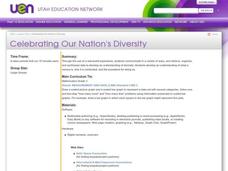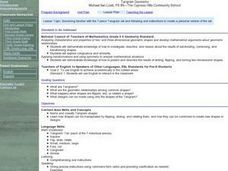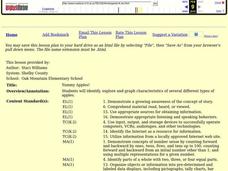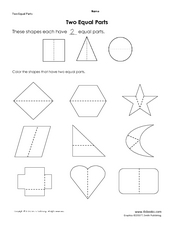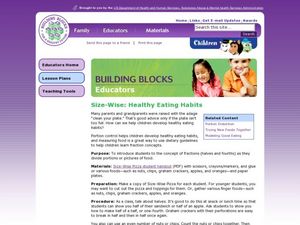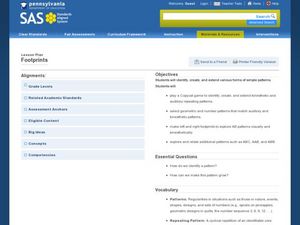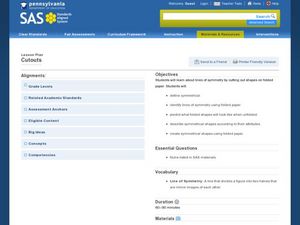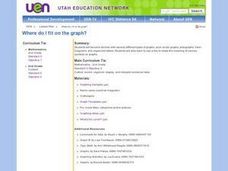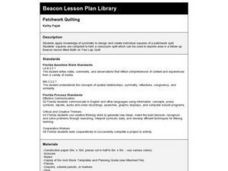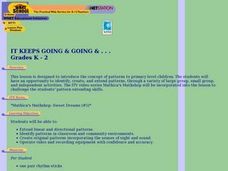Curated OER
Celebrating Our Nation's Diversity
Second graders conduct a class census to measure diversity.
Curated OER
Let's Trade
Second graders engage in a lesson which focuses on adding two-digit numbers and the regrouping process. They identify when the regrouping process is necessary and make appropriate "trades" to complete an addition problem.
Curated OER
Reflections of Symmetry
Students use video and the Internet to identify examples of bilateral and radial symmetry in the world around them. They create symmetrical reflection designs using pattern blocks and paper.
Curated OER
The Perfect City
Students analyze group influences on people, events and culture. They design their own perfect society and report it to the class.
Curated OER
Tangram Geometry
Students listen to a story involving Tangram pieces. Students use Tangram pieces to complete shapes using an outline of a design.
Curated OER
The Spider Beside Her
Second graders are introduced to the characteristics of spiders. In groups, they compare and contrast spiders to different insects to discover spiders are not an insect at all. In groups, they create a model of a spider and discuss its...
Curated OER
Yummy Apples!
Students discuss apples and how they are grown. They listen as the teacher reads "Apples," by Gail Gibbons. Students discuss the story. They view several different types of apples and compare their characteristics. Students taste several...
T. Smith Publishing
Beginning Fractions Equal Parts
After looking at four examples of shapes divided into two exactly equal parts, junior geometers try their hand. One valuable thing about this worksheet is that the shapes are not only the standard circle, square, and triangle, but also...
Curated OER
Size-Wise:Healthy Eating Habits
Students become familiar with portion control. In this healthy habits lesson, students create a meal using pizza and toppings. Students continue adding toppings and cutting away portions until there is none left. ...
Curated OER
Diversity of Colors
Students investigate color diversity by experimenting with jelly beans. In this color spectrum lesson, students observe colored jelly beans through different filters and light sources to change the existing look of the bean....
Curated OER
What's All this Money Madness?
Second graders examine the value of money. In this money instructional activity, 2nd graders read the book Money Madness by David A. Alder and watch Brain Pop Jr. videos. Students discuss why we need money and how people earn money....
Institute of Electrical and Electronics Engineers
Design and Build A Better Candy Bag
Young scholars discuss how the final design for a product can affect its success. They work together to design and develop a better candy bad. They predict the volume and strength they need for the bag to be successful.
Curated OER
Footprints
Students explore patterns. In this patterns geometry lesson, students identify and extend patterns including body parts, movement, geometric shapes, noises, and footprints. Students create and share an original pattern.
Curated OER
Cutouts
Students identify symmetry in shapes. For this geometry lesson, students fold paper to identify lines of symmetry. Students create various symmetrical shapes using folded paper.
Pennsylvania Department of Education
Freckle Face
Students collect and record data. In this early data analysis lesson, students gather data about their partners face. As a class, the students use tally marks and pictographs to record the data and answer question about the information...
Curated OER
How Much is a Million?
Students discover the magnitude of the number 100. The sense of the number is developed by allowing students to experience 100 by counting it, measuring it, feeling it, and doing it, hands-on
Curated OER
Where Do I Fit on the Graph?
Students collect data and create graphs about themselves, their community, and the world around them. They use a variety of methods to organize data, such as stickers, clothespins, name tags, coloring, tally marks, etc.
Curated OER
That's So Square
Students familiarize themselves with the three most common geometric shapes: circles, triangles and parallelograms. They sketch, sort, and name the shapes.
Curated OER
Patchwork Quilting
Second graders use symmetry to create their own small quilt squares. They attach all of the squares to create a large class quilt.
Curated OER
Here's the Pitch
Students define pitch, measure varying amounts of water into containers, make predictions about the sounds made when striking the containers, put containers in order from highest to lowest pitch, and create their own sound patterns with...
Curated OER
It Keeps Going & Going &...
Young scholars extend linear and directional patterns, identify patterns in classroom and community environments, create original patterns incorporating the senses of sight and sound, and operate video and recording equipment.
Curated OER
One Good Turn Deserves Another
Students make observations about shapes and 1-, 2-, and 3-dimensional objects. They conduct observations and make predictions regarding transformations of simple geometric shapes. They identify shapes that occur in household items.
Curated OER
Fast Food Survey Using Bar Graphs
Second graders create a bar graph to pictorically represent the data collected from a survey of students. They use Excel to electronically create the graphs and data tallies. They then interpret their data using sentences to explain.
Curated OER
Valentine Shop
Students use Coin Critters software to practice coin recognition. Students complete a printing project for the cover of Valentine cards and use monthly calendars or a hundreds chart to count by 5's and 10's. Students use KidPix to create...
Other popular searches
- Concept Formation Math
- Concept Formation Math 1st
- Concept Formation Math 2nd
- Concept Formation Math 3rd
